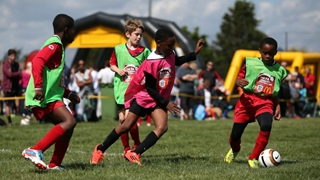
Working Together to Safeguard Football – Our Policy and Procedures
Simply click to view 'Affiliated Footballs' overarching Safeguarding Children Policy and Procedures. Endorsed and co-developed by The FA, Premier League, Football League, PFA, LMA, Football Foundation, League Football Education and NSPCC Child Protection in Sport Unit.
Grassroots Football, Safeguarding Children
Simply click to view Grassroots Footballs Policy and Procedures to gain guidance on: recruiting volunteers, getting the essentials in place, dealing with poor practice, bullying and abuse. Developed specifically to support grassroots clubs and leagues with young teams. Club and Youth League Welfare Offices will be given a copy as part of the The FAs Welfare Officer Workshop.
Safeguarding is everyone’s responsibility
To make sure you have appropriate safeguards in your club or league it is important everyone is aware of your safeguarding children policy and the procedures for reporting a concern about the welfare of a child
Your designated safeguarding officer (club welfare officer) will be able to advise you, but if you want to find out more about how to increase your understanding of safeguarding in football why not complete the Safeguarding Children workshop - for more information visit the safeguarding learning page.
Every affiliated club and league with youth teams must have in place a Safeguarding Children Policy and Procedures.
The FA has developed a template policy for grassroots clubs, click here to view.
Anti-bullying policy
The FA defines bullying as one of the five categories of abuse. Having an Anti-bullying policy in place will help everyone understand what is and is not acceptable within your club. Having a clear process will help your club to manage any issues and hopefully prevent bullying. Simply click here to download The FAs recommended Anti Bullying Policy.
“Whistle-blowing”
Whistle-blowing can be used as an early warning system or when it’s recognised that appropriate actions have not been taken. This approach or policy is adopted in many different walks of life.
It is about revealing and raising concerns over misconduct or malpractice within an organisation or within an independent structure associated with it.
Any adult or young person with concerns about a colleague can also use whistle-blowing by calling 0800 169 1863 and asking for The FA's safeguarding team, or via email on safeguarding@TheFA.com.
Alternatively you can go direct the Police or Children’s Social Care and report your concerns there, or to the Child Protection in Sport Unit via cpsu@nspcc.org.uk or the NSPCC Helpline via 0808 800 5000 or by emailing help@nspcc.org.uk
Attending a Hearing
There may be occasions when are you are asked to attend to a Disciplinary Hearing – either as a Player charged with misconduct, or attending as a witness to misconduct, or as a Match Official giving evidence.
The FA has produced a series of guides to help prepare you for the Hearing and let you know what to expect covering topics such as:
What should I bring with to the hearing?
What should I wear?
Can I bring witnesses with me?
How long do Personal Hearings normally last?
What happens if I am not happy with the result of my Hearing?
Procedures for young people
These can be downloaded from the resources section below.

